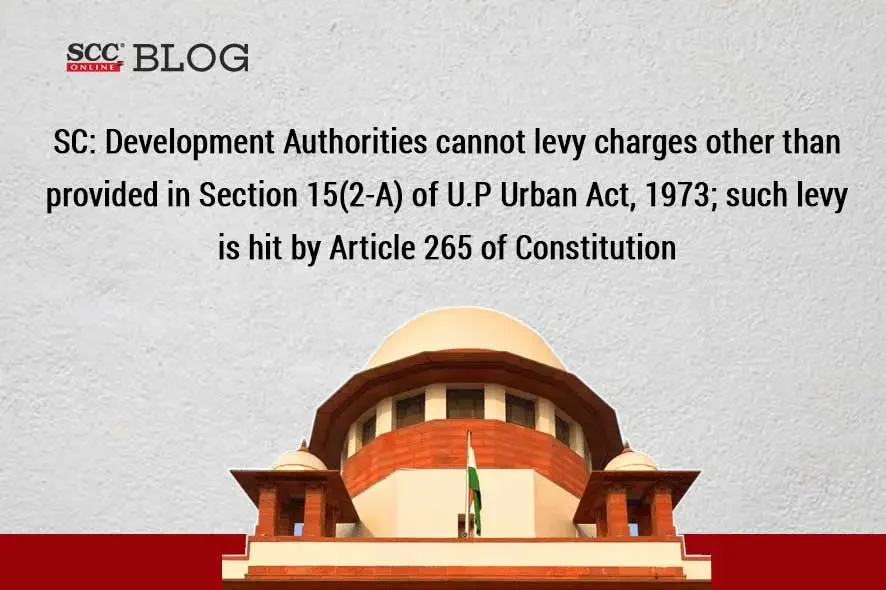Supreme Court: In a set of appeals challenging the order passed by the High Court of Judicature at Allahabad, wherein the High Court had quashed and set aside the various demand notices, except the levy of development charges, raised by the respective Development Authorities and the State of Uttar Pradesh (‘petitioners’), the Division Bench of M.R Shah* and C.T Ravikumar, JJ., upheld the High Court’s order quashing the demand notices levying charges and held that the State cannot issue orders permitting the Development Authorities to levy the charges other than provided under Section 15(2-A) of the Uttar Pradesh Urban Planning and Development Act, 1973 (‘the Act, 1973′).
Background
The case of the petitioners was that while hearing writ petitions challenging the various demand notices by way of external/internal development charges, inspection fee/supervision fee while granting of sanction layout plan, development charges, sub-division charges, stacking charges and impact fee etc., except in one case, wherein the High Court had upheld the levy of development charges. However, the other levies/demands were concerned, i.e., other than development charges, more particularly the sub- division charges etc., the High Court had set aside the said levy or demand notices on the grounds that the Act, 1973, does not permit the levy of other charges other than provided under Section 15(2-A) of the Act, 1973. The High Court also observed and held that such levy/ demand notice based on the orders issued by the State Government, issued in exercise of powers under Section 41 of the Act, 1973, was illegal and bad in law. The levy of other charges, other than development charges was held to be bad in law and in violation of Article 265 of the Constitution of India (‘Constitution’).
Aggrieved by the order of the High Court, the petitioners approached the Court. The petitioners had also challenged the judgment of the High Court in the case, wherein development charges were upheld.
Analysis, Law and Decision
The Court noted that insofar the levy of development charges was concerned, the issue was not res integra, in view of the decision of the Court in State of U.P. v. Malti Kaul, (1996) 10 SCC 425, (‘Malti Kaul’), wherein the Court had upheld the levy of development charges. Therefore, the Court said that issue with respect to levy of development charges was concerned, the same was concluded by the Court in the case of Malti Kaul (supra). Thus, the Court said that the decision of quashing the levy of the development charges by the High Court in one of the case was unsuitable and was set aside by the Court.
The Court perused the Sections 2, 14, 15, 41, 59 of the Act, 1973, to consider the legality of the levy of charges by way of inspection fee/supervision fee while granting of sanction layout plan, sub-division charges, stacking charges and impact fee etc. The Court noted that as per Section 15(2-A) of the Act, 1973, the Development Authorities can levy only those development charges, namely, the mutation charges, stacking fees and water fees. The Act, 1973 does not permit levy of other charges other than provided under Section 15(2-A) of the Act, 1973. The Court noted that the power exercisable under Section 41 of the Act, 1973, by the State were supervisory in nature and the State Government can issue various directions to the Development Authorities for implementation of the provisions of the said Act.
Therefore, the Court said that in exercise of powers under Section 41 of the Act, 1973, the State cannot issue the orders permitting the Development Authorities to levy the charges other than provided under Section 15(2-A) of the said Act.
The Court also said that levy of such other charges was hit by Article 265 of the Constitution. Thus, the Court held that the High Court had rightly set aside the various demand notices by way of levy of inspection fee/supervision fee while granting of sanction lay out plan, sub-division charges, impact fee etc.
The impugned judgments and orders passed by the High Court quashing and setting aside the demand notices, other than impugned judgment quashing aside the development charges, was upheld by the Court.
The Court directed that any amount already paid by the persons, who challenged the demand notices before the High Court, other than the development charges and the charges provided under Section 15(2-A), to be refunded to the respective persons with 6% interest per annum, within a period of twelve months from the date of judgment after adjusting the development charges.
[Mathura Vrindavan Development Authority v. Rajesh Sharma, 2023 SCC OnLine SC 530, Decided on 28-04-2023]
*Judgment Authored by: Justice M.R. Shah







